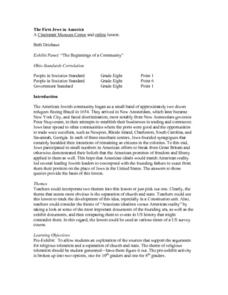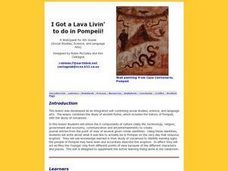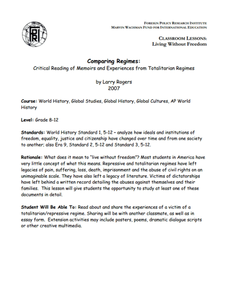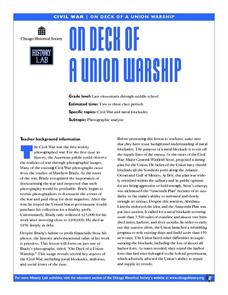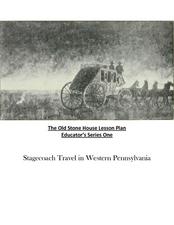National History Day
“Saving the Bear”: The Russian Expeditionary Force of World War One
How have Russian politics affected countries on a global stage? The discussion of the Russian Revolution and World War I begins with an analysis of primary resource letters. Learners finish with a project where they create a timeline of...
Curated OER
Black Power
Use this New York Times lesson to research contemporary leaders in the African-American community. After reading the article "Blacks Weigh the Impact of the Post-Jackson Years," middle and high schoolers discuss the varying viewpoints of...
Curated OER
Crude Conversation
Students analyze text and maps in determining the effect the world's energy resources have on human society, and make charts illustrating at least three ways each resource makes life easier for human society.
Alabama Department of Archives and History
The Great Depression - Hard Times Hit America
To gain an understanding of how the Great Depression affected everyday citizens, class members examine letters written either to the president or to the governor of Alabama asking for assistance.
Curated OER
The First Jews in America
Students investigate how Jews established roots in America. Students determine the difference between religious tolerance and separation of church and state. Students participate in a role-play activity using primary and secondary...
Curated OER
King David
Here is a quick activity on King David, the second king of Israel. It discusses his famous contest with the Philistine warrior Goliath and is followed by a few reading comprehension questions.
Curated OER
I Got a Lava Livin' to Do in Pompeii
Scholars imagine themselves as citizens of Pompeii in 79 AD. First they are assigned a job (or place in society like a child or slave). Then they record their daily activities for the weeks leading up to the eruption of Mt. Vesuvius in...
Stanford University
King Philip's War
King Philip's War was the crescendo of a violent period between the Pequot and English colonists. Using documents from English settlers, including a contemporary report on the conflict, learners explore the little-known period. They then...
Curated OER
How Hard Were the Times? Investigating the Meaning and Significance of the Great Depression
Students examine causes and effects of Great Depression and its significance on twentieth-century life, analyze value of various types of historical information, specifically primary sources, and relate events, issues, problems, and...
Deliberating in a Democracy
Crime and Punishment
Should the United States ban the death penalty? Scholars use real-life examples of criminal activity to come to their own conclusions on the death penalty. Primary source documents, as well as video clips, open the issue of capital...
Foreign Policy Research Institute
Comparing Regimes: Critical Reading of Memoirs and Experiences from Totalitarian Regimes
Can you imagine living in a totalitarian country? Learners will read several primary source memoirs to gain a deeper understanding of what life is like under a controlled government. They'll discuss each piece in pairs, research...
Curated OER
Why Do Governments Exist? Locke, Hobbes, Montesquieu, and Rousseau
Here is a great secondary source reading that includes the primary ideas and philosophies of the famed Enlightenment philosophers: Thomas Hobbes, John Locke, Charles Montesquieu, and Jean-Jacques Rousseau. In additional to discussing...
Curated OER
Basic Needs
High schoolers examine the unique and diverse historical artifacts that people have designed to fulfill their everyday needs in extraordinary ways. They identify ways humans have used design throughout history to enhance the ways they...
National Endowment for the Humanities
Revolution '67, Lesson 1: Protest: Why and How
To some people, protesting is as American as apple pie, but the factors that lead to protests can be as confusing to veteran activists as to today's youth. Revolution '67 explores the riots in Newark, New Jersey as a case study. ...
Facing History and Ourselves
Justice After the Holocaust
Though there could be no true justice for the horrors of the Holocaust, many of those responsible for crimes against humanity were found guilty in the eyes of the law. Using primary and secondary sources in the 16th installment of a...
National Endowment for the Humanities
Albert Sabin and Bioethics: Testing at the Chillicothe Federal Reformatory
Do the ends justify the means? Getting a drug approved in the US is a long and involved process. But at some point out, it involves testing on humans. The ethics of such testing is the focus of a resource that uses Dr. Albert...
Curated OER
Aboriginal Education - A Canadian Failure?
Students discover that the education of the Aboriginal was a government and church "mission." They develop respect for the Aboriginal people and their continuing concerns about their treatment at the hands of the missionaries and the...
Curated OER
Signs and Symbols
Sixth graders carefully analyze a triptych of the nativity, paying close attention to the lines, shapes and symbols included in the artwork. They explore the role of the Catholic church in society at the time the piece was created and...
Curated OER
Intolerance in American History
Examine the United States through the lens of intolerance using this 2-week unit plan, which includes details for 13 days of instruction. Scholars study examples of prejudiced behavior throughout history, discuss issues in groups,...
Curated OER
The Great Depression and Everyday Life
Examine everyday life during the Great Depression, as well as the effects if the Depression on American population, society, and economy. Learners write who, what, where, when, and why summaries of a person who relocated to California...
Reading Through History
Anti-Federalist Paper No. 3
Who were the Anti-Federalists and what do primary sources tell young historians about their beliefs? Learners read Paper No. 3 to understand their values in relation to government, such as their discussion on foreign policy and the pros...
Curated OER
On Deck of a Union Warship
Students examine role of Naval blockades in Union war strategy, and analyze primary source image "On Deck of a Union Warship" and make detailed observation about people and activities shown.
Facing History and Ourselves
The Weimar Republic: Historical Context and Decision Making
Did you know that way before Hitler became a dictator, he actually spent nine months in a German jail? Provide the background for the escalating point before the Nazi party took over in World War II through the exercises in the resource....
Curated OER
Old Stone House Lesson Plan
From stagecoach to railroad tracks, your class will discover how advancements in travel in the United States during the nineteenth century played an integral role in the industrialization and development of American society. The main...






